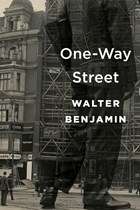One-Way Street

Editorial Harvard University Press
Fecha de edición mayo 2016 · Edición nº 1
Idioma inglés
EAN 9780674052291
Libro
encuadernado en tapa blanda
Resumen del libro
Presented in a new edition with expanded notes, this genre-defying meditation on the semiotics of late-1920s Weimar culture, composed of 60 short prose pieces that vary wildly in style and theme, offers a fresh opportunity to encounter Walter Benjamin at his most virtuosic and experimental, writing in a vein that anticipates later masterpieces.
One-Way Street is a thoroughfare unlike anything else in literature by turns exhilarating and bewildering, requiring mental agility and a special kind of urban literacy. Presented here in a new edition with expanded notes, this genre-defying meditation on the semiotics of late-1920s Weimar culture offers a fresh opportunity to encounter Walter Benjamin at his most virtuosic and experimental, writing in a vein that anticipates later masterpieces such as On the Concept of History and The Arcades Project.
Composed of sixty short prose pieces that vary wildly in style and theme, One-Way Street evokes a dense cityscape of shops, cafes, and apartments, alive with the hubbub of social interactions and papered over with public inscriptions of all kinds: advertisements, signs, posters, slogans. Benjamin avoids all semblance of linear narrative, enticing readers with a seemingly random sequence of aphorisms, reminiscences, jokes, off-the-cuff observations, dreamlike fantasias, serious philosophical inquiries, apparently unserious philosophical parodies, and trenchant political commentaries. Providing remarkable insight into the occluded meanings of everyday things, Benjamin time and again proves himself the unrivalled interpreter of what he called the soul of the commodity.
Despite the diversity of its individual sections, Benjamin's text is far from formless. Drawing on the avant-garde aesthetics of Dada, Constructivism, and Surrealism, its unusual construction implies a practice of reading that cannot be reduced to simple formulas. Still refractory, still radical, One-Way Street is a work in perpetual progress.
Biografía del autor
Nació en Berlín en 1892, en el seno de una próspera familia judía. Estudió filosofía y se licenció en Berna en 1918 con una tesis sobre el concepto de crítica del arte en el Romanticismo alemán. Trabajo singular con el que sin embargo no consiguió integrarse en la institución académica, aunque su nombre se asocia indefectiblemente con la formación temprana de la Escuela de Frankfurt. Influido por la mística judía y el marxismo, dejó una obra polifacética en la que se combina la filosofía, la sociología y la crítica literaria, y cuya influencia ha ido creciendo exponencialmente desde su muerte. Se quitó la vida en Portbou, al creer que las autoridades lo devolverían a los nazis, de los que huía, de una manera o de otra, desde 1933.








